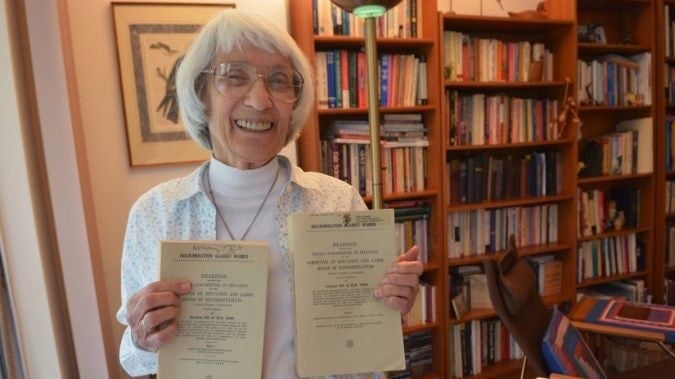Bernice Sandler, the mother of Title IX legislation, has died
In the late 1960s, frustrated by a string of rejections from tenure-track academic positions, educational psychologist Bernice Sandler began researching sex discrimination in higher education.


In the late 1960s, frustrated by a string of rejections from tenure-track academic positions, educational psychologist Bernice Sandler began researching sex discrimination in higher education.
In the footnotes of an academic article on civil rights legislation, Sandler spotted a reference to a new and little-noticed executive order that barred organizations accepting federal dollars from discriminating on the basis of sex.
“Even though I was alone, I shrieked aloud with my discovery,” Sandler later wrote. “Yes, there was a legal route to combat sex discrimination even though few people knew it at the time.”

Sandler found the start of a trail that would lead to the passage of Title IX, the 1972 US law barring sex discrimination in any school that receives federal money. Sandler, who died Jan. 5 at the age of 90, was the driving force behind the law’s creation, collecting data, filing class-action lawsuits against universities, organizing congressional letter-writing campaigns, and eventually testifying at congressional hearings.
Those efforts paid off with US president Richard Nixon’s signature on a bill containing this short, key paragraph: “No person in the United States shall, on the basis of sex, be excluded from participation in, be denied the benefits of, or be subjected to discrimination under any education program or activity receiving Federal financial assistance.”
The bill didn’t receive much attention at the time. Almost half a century later, though, it’s hard to comprehend how utterly different the landscape is as a result of it.
Women can’t be barred from teaching at co-ed institutions or paid less simply because of their gender. Boys and girls alike get to choose the electives that interest them most, and are no longer assigned to woodworking or cooking based on their gender. It’s no longer legal to expel a student for becoming pregnant, nor to tolerate sexual assault on campus. Julie Foudy, captain of the 1999 US women’s soccer team that won the World Cup, traced her team’s achievements to the fact that the players were able to pursue sports at the collegiate level: “It all trails back to Title IX, for sure.”
“Every woman who has gone to college, gotten a law degree or a medical degree, was able to take shop instead of home-ec, or went to a military academy really owes [Sandler] a huge debt,” Sandler’s colleague Margaret Dunkle told the New York Times.
Not even Sandler realized at the time just how big a project she had started. “I believed that if we passed Title IX it would only take a year or two for all the inequities based on sex to be eliminated,” Sandler once wrote. “After two years, I upped my estimate to five years, then to 10, then to 25, until I finally realized that we were trying to change very strong patterns of behavior and belief, and that changes would take more than my lifetime to accomplish.”
Long and full as Sandler’s life was, the work is still ongoing.